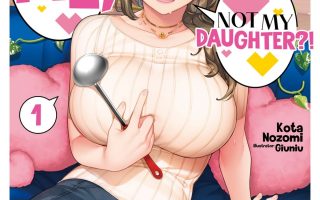I am shook. I am trembling as I write this post. I did not expect Butareba: The Story of a Man Turned into a Pig to actually be a good series. I did not expect it to tug on my heartstrings and leave me staring blankly at the ceiling for a long while after I read it. What the hell? Wasn’t this supposed to be some trashy isekai anime? How did it turn into such an emotional story about powerless people (and a pig) struggling against a cruel world?
I know that some of you are probably reading this claim with scepticism. The first episode of the currently airing anime was borderline unwatchable with all of its dumb, pervy jokes, and that was before the production values started tanking to apocalyptic levels. But the story is actually a cleverly constructed mystery. Every narrative choice, however questionable it seems on the surface, actually has plot and/or thematic significance. Let me break it all down.
Start Light, End Heavy
There is only one moral I wish to impart on you with this story, my brethren, and it’s simple: cook your pig liver first. I’m telling you right now, never even think about eating that stuff raw.
Butareba, Volume 1, Chapter 1
The beginning of Butareba is deceptively light-hearted. A nineteen-year-old male university student eats a raw pig liver, loses consciousness, and finds himself in a medieval Europe-like fantasy world. True to the genre playbook, there is exactly one immediately apparent gimmick to the stereotypical isekai set-up. In this case, our protagonist has turned into a pig who can only communicate in oinks and grunts. Oh no, whatever shall he do?
Fortunately, he swiftly encounters a girl named Jess who can read minds, and it just so happens that the place where he can return to human form is also her destination. Our protagonist notes that this is a rather convenient set of coincidences, but doesn’t think much about it at first. After all, he assumes, their tale is a light-hearted romp through a fantasy world. It only makes sense that things would just naturally fall into place for them.
The plot takes its sweet time revealing the true nature of Jess’s journey to the royal capital. The first indication that something might be amiss is hidden between the lines of the initial silly banter. Jess is excessively polite, servile, and—most worryingly—gullible in the way she interacts with our hero. Anyone who understands an otaku’s sense of humour would probably grasp that the pig has a tendency to exaggerate his perverted thoughts for comedic effect. He is maybe 10-20% horny, but the rest of him is entirely self-deprecating. Case in point:
Ahhhhh! This is the life! This is paradise! My brethren, have you ever been treated like a mere animal by a beautiful girl? You probably haven’t. You pitiful creatures.
Butareba, Volume 1, Chapter 1
For an otaku who is used to being judged negatively for his thoughts and fetishes, Jess’s complete lack of affront comes across to him as naïve and a sign that she may not respect herself enough. It comes as no surprise when she mentions that she has lived a life of servitude to the local lord for as long as she can remember. Later, when she goes shopping in town for an expensive magic implement, she is almost scammed by a shady backstreet dealer. Perhaps it makes sense that her mind-reading powers don’t really help her when she has already demonstrated how she consistently takes the pig’s thoughts at face value.
It’s not necessarily an unusual plot turn for the isekai hero to recognise that the heroine is a vulnerable member of her society and to gallantly vow to protect her. Things don’t seem too dire even when the shady backstreet dealer decides to hunt Jess down and kill her for potentially cottoning on to his illegal activity. The guy is past his prime and has only one good eye and a dodgy leg. As a villain, his power levels are scaled-down enough for a pig and an unarmed girl to confront in a battle and win. Even so, things still get hairy enough for the pig to suffer a fatal knife wound. He only survives because the guy was carrying magic tools, which Jess uses to heal him.
This first fight is a wakeup call. The very fact that the antagonist is laughably pathetic and still comes that close to winning really drives home the fact that our heroes are—more than anything—powerless.
And that’s just chapter one.
Otaku Can’t Fall In Love
“Jess and I only met yesterday. She was nice to me, and I ended up with a one-sided infatuation with her for a flimsy reason like that. That’s all to the story, and it ends there.”
Butareba, Volume 1, Chapter 2
This might be a strange thing to say about a pervy pig, but if you separate his thoughts from his actions, he is a gentleman. Or perhaps it might be more accurate to say that, implicit within his easily misunderstood sense of humour, there is a thoughtful and considerate ethos. He is actually deeply mortified and embarrassed when she hears his inward thoughts and takes them seriously. A recurring joke throughout the story is him insisting “Stop reading the narration!” whenever she reacts to thoughts that he’s not intending to communicate to her telepathically.
In the climax of chapter one, he equates his feelings for Jess to that of an idol otaku for their oshi: “I’m sure you know the rules, my brethren. No matter what kind of beautiful young maiden you meet or see, falling in love and using that as an excuse to disturb their private life is nonsense. Gently rooting for them at a distance is the job of us otaku.”
One can detect a fine line between respecting another person’s boundaries and a self-defeating mindset where you assume that nobody could ever possibly have romantic feelings for you (but still obsessing over the target of your affections anyway). Our pig protagonist leans towards the latter tendency, but in chapter two he confronts a test of character. Does he actually respect Jess’s agency enough that he can trust her to make choices he doesn’t agree with? Despite insisting that he doesn’t deserve a relationship with her, can he stand by and watch her become intimate with another man without interfering?
Chapter two introduces Naut, a conventionally attractive young man with a surly attitude and a deep, personal reason to aid Jess in her quest. In many ways, he seems more like an appropriate hero of the tale than the intrepid pig. He quickly gets close to Jess, and when she gets drunk he takes her back to her room at the inn. She insists to the pig that she can trust Naut not to assault her…but that night, Naut does not immediately leave her room after escorting her. As she sleeps, the pig hears him murmur, “Hug me.”
What follows is one of the most excellently written descriptions of jealousy: “My thoughts froze. An intense, unpleasant emotion like never before filled my stomach in a flash. It almost felt scalding, or something that was trembling and fragile as it swallowed me whole.”
There are so many layers to this moment. The pig feels terrible because he is in love with Jess, and it isn’t just admiration for an oshi, no matter what he tells himself. He also keenly feels his powerlessness, and in some ways it is more disquieting than his near-death experience in the previous chapter. If Naut did choose this moment to assault Jess, neither she nor the pig would be unable to stop it. The only thing the pig can do in this scene is trust Jess—which he does. And things do turn out fine.
There are no scenes of sexual assault in the book. But even an assault that doesn’t happen—not even attempted—can still be profoundly impactful to the human psyche. Without lifting a finger, Naut exposes the vulnerabilities of both Jess and the pig. As an individual, he proves himself to be worthy of trust, but anyone else in his position could have harmed the sleeping Jess. This is a major reason why the pig swallows his jealousy and asks Naut to accompany them on their journey.
There is something so terribly sad about all of this. About being so powerless that you would feel the need to ask someone who could be a rapist to protect you. It’s the moment that really sets the tone for the pig’s relationship with Jess. He might be her companion, but he can’t be her lover or her protector. Even at the very end, when it’s just the two of them once again, he stifles his feelings. Everything he does is for her sake. He cannot change the world.
Don’t Laugh in the Face of a Desperate Prayer
“Death is salvation for me. Please let me die already. It was my fault for being born like this. It was my fault for being born as a Yethma. It was my fault for tempting everyone with my body, with my looks, with my voice.”
Butareba, Volume 1, Chapter 3
Early in chapter two, Jess opens up emotionally to the pig and explains that she, like all other members of the Yethma race when they turn sixteen, is obliged to set out on a perilous journey to the capital. Most Yethma will get hunted and killed for their body parts and magic collars without ever reaching their destination. The ones who do make it to the end disappear inside the capital’s reclusive walls, never to be seen again.
Allegedly, they find happiness there.
This information immediately casts the journey in a new light. Far from the simple errand that Jess initially made it out to be, it is a fateful one-way trip. Jess came to terms with her mortality long before she even took her first step.
Running from this fate is impossible. Some years before the events of the story, the Yethma who hid out in a convent instead of going on the journey were all brutally murdered. More than anything, the Yethma have lived their lives so engrained with the idea of following orders that most of them willingly carry out their duty.
A fatalistic tone begins to creep over the novel, to the point where you actually start wanting the pig to make silly jokes. Everyone else placidly accepts this state of affairs, but as an outsider, the pig constantly wonders how a world predicated on such violence and oppression can even function.
One of the most heartbreaking scenes in the novel is in chapter three, when the party rescues a Yethma named Blaise. Despite being saved, Blaise is listless; she has already given up on staying alive. Just before the climax of the novel, she opens up to the pig for the first and only time—to comment on one of his pervy jokes.
“Noble Pig,” she says telepathically, “is it true that in your world, men prefer women with small breasts?”
In just this short conversation, Blaise implies a tragic backstory. She feels that she “tempted” men into attacking her because of her body shape. Sexual assault against Yethma is strictly forbidden by the king’s decree, but it seems to go unpunished if the Yethma is either killed or has her sexual organs removed shortly after. The latter is what happened to Blaise, and she has the infected scars to prove it.
The only thing she takes solace in is what the pig represents to her. There is another world out there, and in that world (she believes), men don’t like large breasts, and they don’t assault women. When she inevitably dies, she prays to be reborn there.
The sad irony of Blaise’s hopeful image of Earth as a utopia without sexual assault would not be lost on a reader, and I doubt that it is lost on the pig either. But he tells her: “I came here even without praying. You’ve prayed for so long, it wouldn’t make sense if you can’t hop over.” As the title of the chapter goes, “Don’t Laugh in the Face of a Desperate Prayer.”
The Reveal (Big Spoilers Here)
In the final chapter, after Jess and the pig finally make it to the royal capital, the king reveals the reason behind the Yethma’s awful treatment. The answer is not actually too surprising to anyone paying attention to the world-building details scattered throughout the story, but the way it all comes together to make a poignant point about the nature of oppression is satisfying.
The rationalisation goes like this: In the past, there were multiple mage bloodlines which came into conflict, causing bloody wars. After the dust settled, only the king’s bloodline survived, and they decided that only a few mages needed to exist at the apex for the sake of a harmonious society. So they made themselves the privileged people, and then created the label “Yethma” for everyone else with the same bloodline. The so-called “Yethma” were treated as second-class citizens for multiple reasons:
The existence of a lower class creates a sense of hierarchy in society, and gives the non-mages a feeling of superiority over someone.
Only a very small number of mages need to rule, but the overall population of Yethma needs to remain high to maintain social order.
The journey to the capital is a trial to weed out most of the Yethma, so that only the chosen few can join the privileged society and perpetuate the bloodline.
Isolating the Yethma and treating them as slaves made them less likely to cause violent conflict in general because they internalised feelings of worthlessness.
In addition, only the female Yethma are sent out into the world because, quite literally, it is easier to monitor their sexuality. The king does not want any Yethma reproducing outside the walls of the capital, hence the decree against sexual assault.
I liked the reveal that the distinction between the ultra-privileged class and the oppressed class in this world was completely artificial. And I also liked how the ethnic oppression intersected with gender and sexual oppression. These two factors made the fantasy racism metaphor feel more real to me. Throughout the novel, we meet a range of people with different attitudes towards the Yethma, and these also mirrored the complexity of racist attitudes in real life.
Oh, but Butareba is not trying to preach to its readers, because don’t forget that there is only one moral to the story: “Cook your pig liver first.”
That cheekiness and subtle glibness, even after the story goes to some very dark and heavy places, is what makes the themes resonate with me harder, somehow. It’s what makes it possible to stay hopeful even in a cruel and complicated world.
In Conclusion
I really didn’t expect to say this, given the very trashy initial impression, but Butareba is the best English light novel debut I’ve read this year. The pervy pig has a layered personality, the “other world” motif has weighty narrative significance, and the story is genuinely heartfelt and emotional. I felt a little teary reading the final scene between the two main characters, even.
I would recommend Butareba mostly to fans of Re:Zero. They both take inspiration from the mystery genre, they both focus on a powerless protagonist who mainly uses his wits to save the heroine, and they’re both dark fantasies with deceptively cheerful beginnings. The anime is a production disaster, even if it is the funniest role in Yoshitsugu Matsuoka’s career, so I would have to recommend the light novel instead to anyone interested in the story.
But yeah, don’t overlook it if you’re into fantasy with a bit of punch to it! I wrote a 2,700+ word essay about the themes and stuff—that’s gotta count for something, right?!




